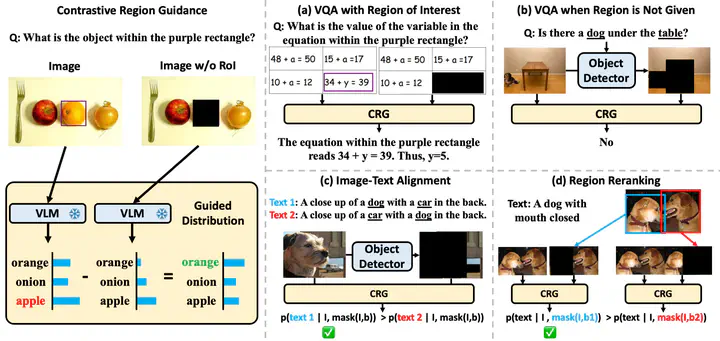Contrastive Region Guidance: Improving Grounding in Vision-Language Models without Training

Abstract
Highlighting particularly relevant regions of an image can improve the performance of vision-language models (VLMs) on various vision-language (VL) tasks by guiding the model to attend more closely to these regions of interest. For example, VLMs can be given a “visual prompt”, where visual markers such as bounding boxes delineate key image regions. However, current VLMs that can incorporate visual guidance are either proprietary and expensive or require costly training on curated data that includes visual prompts. We introduce Contrastive Region Guidance (CRG), a training-free guidance method that enables open-source VLMs to respond to visual prompts. CRG contrasts model outputs produced with and without visual prompts, factoring out biases revealed by the model when answering without the information required to produce a correct answer (i.e., the model’s prior). CRG achieves substantial improvements in a wide variety of VL tasks – When region annotations are provided, CRG increases absolute accuracy by up to 11.1% on ViP-Bench, a collection of six diverse region-based tasks such as recognition, math, and object relationship reasoning. We also show CRG’s applicability to spatial reasoning, with 10% improvement on What’sUp, as well as to compositional generalization – improving accuracy by 11.5% and 7.5% on two challenging splits from SugarCrepe – and to image-text alignment for generated images, where we improve by up to 8.4 AUROC and 6.8 F1 points on SeeTRUE. When reference regions are absent, CRG allows us to re-rank proposed regions in referring expression comprehension and phrase grounding benchmarks like RefCOCO/+/g and Flickr30K Entities, with an average gain of 3.2% in accuracy. Our analysis explores alternative masking strategies for CRG, quantifies CRG’s probability shift, and evaluates the role of region guidance strength, empirically validating CRG’s design choices.